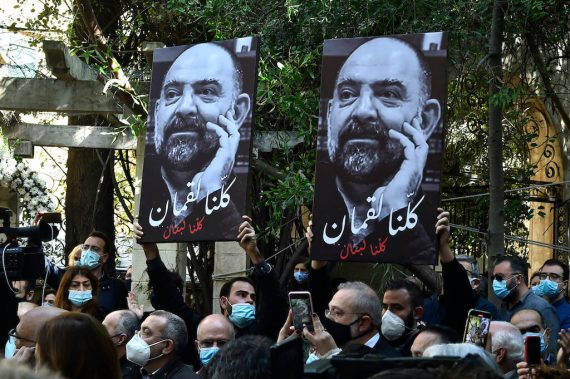Almost forty days have passed since the assassination of Lebanese political activist and staunch Hezbollah detractor Lokman Slim, with no evidence or any leads provided by the Lebanese state on the culprits of his heinous murder.
Slim, aged 58, was found dead in his rental car on the morning of February 4, with six bullets in his body, five to his back and one to his head. He was returning from his friend’s house in the southern village of Neha, deep in Hezbollah-controlled territory, 28 km from the Lebanese-Palestinian border.
Slim’s execution-style murder and the mystery that shrouds it has led to the simple conclusion that Hezbollah is responsible for silencing this furious and uncompromising voice against the Iranian militia’s hegemony over the Shiite cultural and public sphere, a hegemonic grip which Hezbollah extended to include different aspects of Lebanon’s non-existent state.
Naturally, Hezbollah denied its involvement or even knowledge of Slim’s assassination and condemned the crime. It asked “the judicial and security authorities concerned to work quickly to expose the culprits and punish them.” Ironically, Hezbollah’s alleged trust in the judicial system was nowhere to be found when the United Nation’s Special Tribunal for Lebanon found high-ranking members of its security apparatus guilty of killing Lebanon’s former Prime Minister Rafik Hariri in 2005.
To add insult to injury, in his latest televised speech, Hassan Nasrallah, Hezbollah’s secretary general, downplayed the killing of Slim speaking for over an hour without mentioning his name, claiming that the fact that Slim was killed in an area controlled by Hezbollah does not indicate their culpability, and hinted that Slim’s killing might be the work of Israel or any Western party which benefits from politically accusing Hezbollah of the murder.

VIDEO: Lebanese mourn slain activist Lokman Slim
If this were the case and Israel was involved in Slim’s abduction and killing, Hezbollah needs to justify why they did not impose a full lockdown on Slim’s crime scene and why they failed to provide any sort of lead or information to the Lebanese security agencies investigating the crime.
Traditionally, in all security incidents which involve Israel, like the mysterious explosion which rocked the southern village of Ain Qana, Hezbollah was swift to impose a lockdown on the area and prevented the press as well as the Lebanese security agencies from accessing the town, something which they have done multiple times before.
If one is to accept the logic of Nasrallah, or rather the lack thereof, in other words, seeking the help of the judiciary to solve the murder of Slim, it is natural to examine the three elements of any crime – motive, means, and opportunity – and apply them to the life and death of Lokman Slim.
When it comes to motive, Lokman Slim made a career of openly challenging all forms of authority starting with his establishing of UMAM Documentation and Research, an NGO which was concerned with preserving the memories of Lebanon’s 15-year-long civil war, memories which Lebanon’s ruling establishment chose to bury alongside the bodies of its fallen victims.
Additionally, as a Shiite activist and a native of the town of Haret Hreik, in the heart of the Hezbollah-controlled southern suburbs of Beirut, Slim worked diligently to reclaim and challenge the ideological grip of Persian Shi’ism as imported by Hezbollah. This earned Slim and his family daily badgering and intimidations by Hezbollah and their band of hoodlums, some of whom were his neighbors, who went as far as branding him an Israeli collaborator which in Hezbollah’s understanding of the word is a call for murder.
Hezbollah has the required skills to abduct, interrogate, and execute a civilian like Lokman Slim, while equally terrorizing any witnesses from stepping forward and exposing the group.
If we are to explore the means of the crime it would clearly confirm that Hezbollah, with its infinite security and military means, is beyond capable of carrying out a such targeted assassination deep in its controlled areas without leaving any traces or even witnesses. Hezbollah, which is fully immersed in Iran’s regional wars, in Syria, Iraq, Yemen, and beyond, has the required skills to abduct, interrogate, and execute a civilian like Lokman Slim, while equally terrorizing and preventing any witnesses from stepping forward and exposing the group.
Recommended
Third, Hezbollah had the opportunity to carry out Slim’s murder simply because they knew they can get away with it – like they have done many a time before. At this particular moment, when the Biden administration and the European Union are so eagerly pursuing the reassumption of the Iranian nuclear deal talks, the killing of Lokman Slim would simply go unnoticed and would join the tens of similar political crimes that remain unsolved.
Consequently, if one is to review the aforementioned legal principles, the first suspect the Lebanese judiciary needs to summon is Nasrallah himself and hundreds of his party members who need to provide alibies and concrete evidence of their innocence. Realistically, however, this utopian judicial measure will never take place as long as Hezbollah is in possession of its Iranian arsenal of arms that grants it absolute powers and full impunity.
Lokman’s murder is simply a preemptive strike carried out by Iran’s proxy, Hezbollah, that wants to send a violent message to its own Shiite constituency: Hezbollah is are no longer hesitant to kill its own Shiite “brothers” and in their own abode if needed, and any future challenge to its authority will be met with blood and iron.
The brutal assassination of Lokman Slim will continue to perplex people in terms of its timing and its ultimate objectives. Yet, anyone who is slightly familiar with Slim’s life and career does not need to look for justification of why Iran’s Lebanese militia feared Slim’s brave rhetoric and resistance to their prevailing narrative – they feared these more than Israel’s warplanes and hit squads.
To Hezbollah, which is accused of killing Lokman Slim, this might be another chapter in their ongoing drive to dominate Lebanon and the region, but in reality, this might indeed be the epilogue for a horror story which will not end well for the Lebanese villains.





